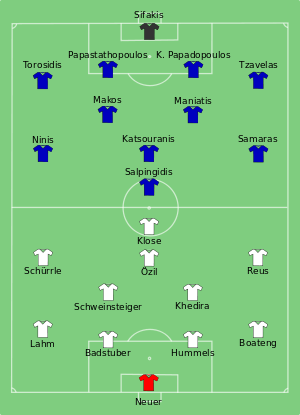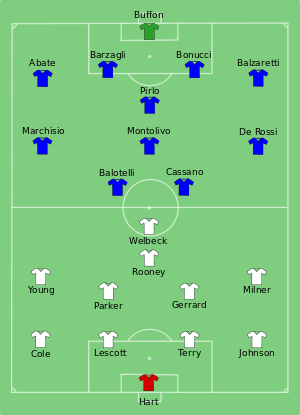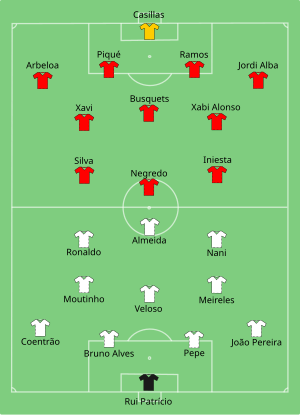| Revision as of 19:42, 6 August 2012 editAheyfromhome (talk | contribs)Extended confirmed users, Pending changes reviewers4,071 edits Rv No explaination← Previous edit | Revision as of 18:30, 9 August 2012 edit undoOcee (talk | contribs)Extended confirmed users5,643 editsm →Group stage: - changing uefa coefficient note to small textNext edit → | ||
| Line 423: | Line 423: | ||
| # Drawing of lots. | # Drawing of lots. | ||
| Note: As all teams have different ], the last two tie-breakers (fair play conduct and drawing of lots) would never have applied in this tournament. | <small>Note: As all teams have different ], the last two tie-breakers (fair play conduct and drawing of lots) would never have applied in this tournament.</small> | ||
| {| class="wikitable" | {| class="wikitable" | ||
Revision as of 18:30, 9 August 2012
This article is about the sporting event. For the video game based on this event, see UEFA Euro 2012 (video game).| It has been suggested that UEFA Euro 2012 schedule be merged into this article. (Discuss) Proposed since June 2012. |
| Mistrzostwa Europy w Piłce Nożnej 2012 Template:Pl icon Чемпіонат Європи з футболу 2012 Template:Uk icon | |
|---|---|
 UEFA Euro 2012 official logo UEFA Euro 2012 official logo | |
| Tournament details | |
| Host countries | Poland Ukraine |
| Dates | 8 June – 1 July |
| Teams | 16 |
| Venue(s) | 8 (in 8 host cities) |
| Final positions | |
| Champions | |
| Runners-up | |
| Tournament statistics | |
| Matches played | 31 |
| Goals scored | 76 (2.45 per match) |
| Attendance | 1,440,896 (46,481 per match) |
| Top scorer(s) | (3 goals each) |
| Best player(s) | |
| ← 2008 2016 → | |
The 2012 UEFA European Football Championship, commonly referred to as Euro 2012, was the 14th European Championship for national football teams organised by UEFA. The final tournament was hosted for the first time by Poland and Ukraine, between 8 June and 1 July 2012, after their bid was chosen by UEFA's Executive Committee in 2007. Euro 2012 set the record for both the highest aggregate attendance (1,440,896) and the highest average attendance per game (46,481) under the 16-team format (since 1996).
The final tournament featured 16 nations, the last European Championship to do so; from Euro 2016 onward, there will be 24 finalists. Qualification was contested by 51 nations between August 2010 and November 2011 to determine the remaining 14 finalists. The tournament was played across eight venues, four in each host country, five of which were newly built for the tournament. Aside from venues, the host nations have also invested heavily in improving infrastructure, such as railways and roads, at UEFA's request.
The tournament opened with a 1–1 draw between Poland and Greece at the National Stadium in Warsaw on 8 June 2012. The final match took place 23 days later on 1 July 2012 at the Olympic Stadium in Kiev, where Spain defended their title with a 4–0 win over Italy. Spain became the first team to win two consecutive European Championships, and the first international team to win three straight major tournament titles (Euro 2008, 2010 World Cup and Euro 2012). Since Spain had already gained entry to the 2013 Confederations Cup by winning the 2010 World Cup, the runners-up Italy qualified.
Euro 2012 was the second consecutive European Championship (after Euro 2008 held in Austria and Switzerland) in which neither of the hosts emerged from the group stage, as both Poland and Ukraine were eliminated.
Bid process
Main article: UEFA Euro 2012 bidsThe hosting of the event was initially contested by five bids representing seven countries: Croatia–Hungary, Greece, Italy, Poland–Ukraine, and Turkey. After an initial consideration of the bid data in 2005 by UEFA both the Greek and Turkish bids were eliminated from the process to leave three candidates. This was followed by a second round of the selection process which among other included visits by UEFA to all candidates. On 18 April 2007, the Poland–Ukraine bid was chosen by a vote of the UEFA Executive Committee at a meeting in Cardiff.
Poland–Ukraine became the third successful joint bid for the European Championship, after those of Belgium–Netherlands (2000) and Austria–Switzerland (2008). Their bid received an absolute majority of votes, and was therefore announced the winner, without requiring a second round. Italy, which received the remaining votes, had been considered favourites to win the hosting, but incidents of fan violence and a match fixing scandal were widely cited as factors behind their failure.
There were some later alterations from the initial bid plan, regarding the venues, before UEFA confirmed the eight host cities in 2009. During the preparation process in Poland and Ukraine, UEFA repeatedly expressed concern about their preparation to host the event, with different candidates reported as being alternative hosts if they did not improve; however, in the end, UEFA affirmed their selection.
Qualification
Main article: UEFA Euro 2012 qualifyingThe draw for the UEFA Euro 2012 qualifying competition took place in Warsaw on 7 February 2010. Fifty-one teams entered to compete for the fourteen remaining places in the finals, alongside co-hosts Poland and Ukraine. The teams were divided into nine groups, with the draw using the new UEFA national team coefficient for the first time in order to determine the seedings. As defending champions, Spain was automatically top seeded. The qualifying process began in August 2010 and concluded in November 2011. At the conclusion of the qualifying group stage in October 2011, the nine group winners qualified automatically, along with the highest ranked second placed team. The remaining eight second placed teams contested two-legged play-offs, and the four winners qualified for the finals.
Twelve of the sixteen finalists participated at the previous tournament in 2008. England and Denmark made their return to the Euro, having last participated in 2004, while Republic of Ireland returned after a twenty-four year absence to make their second appearance at a European Championship. One of the co-hosts, Ukraine, made their debut as an independent nation (before 1992 Ukraine participated as part of the Soviet Union). With the exception of Serbia – according to UEFA's ranking at the end of the qualifying stage – Europe's sixteen highest-ranked teams all qualified for the tournament.
Qualified teams
The following sixteen teams qualified for the finals:
| Country | Qualified as | Date qualification was secured | Previous appearances in tournament |
|---|---|---|---|
| Co-hosts | 18 April 2007 | 1 (2008) | |
| Co-hostsA | 18 April 2007A | 0 (debut) | |
| Group A winner | 2 September 2011 | A10 (1972, 1976, 1980, 1984, 1988, 1992, 1996, 2000, 2004, 2008) | |
| Group B winner | 11 October 2011 | 9 (1960, 1964, 1968, 1972, 1988, 1992, 1996, 2004, 2008) | |
| Group C winner | 6 September 2011 | 7 (1968, 1980, 1988, 1996, 2000, 2004, 2008) | |
| Group D winner | 11 October 2011A | 7A (1960, 1984, 1992, 1996, 2000, 2004, 2008) | |
| Group E winner | 6 September 2011A | 8 (1976, 1980, 1988, 1992, 1996, 2000, 2004, 2008) | |
| Group F winner | 11 October 2011B | 3 (1980, 2004, 2008) | |
| Group G winner | 7 October 2011 | 7B (1968, 1980, 1988, 1992, 1996, 2000, 2004) | |
| Group H winner | 11 October 2011C | 7C (1964, 1984, 1988, 1992, 1996, 2000, 2004) | |
| Group I winner | 6 September 2011B | 8A (1964, 1980, 1984, 1988, 1996, 2000, 2004, 2008) | |
| HBest runner-up | 11 October 2011D | 4 (1992, 2000, 2004, 2008) | |
| Play-off winner | 15 November 2011 | 3A (1996, 2004, 2008) | |
| Play-off winnerA | 15 November 2011A | 7D (1960, 1976, 1980, 1996, 2000, 2004, 2008) | |
| Play-off winnerB | 15 November 2011B | 5A (1984, 1996, 2000, 2004, 2008) | |
| Play-off winnerC | 15 November 2011C | 1A (1988) |
- Bold indicates champion for that year. Italics indicate (co-)host.
- from 1972–88, Germany competed in the European Championship final tournament as West Germany
- from 1960–88, Russia competed in the European Championship final tournament as the Soviet Union and in 1992 as the Commonwealth of Independent States
- from 1960–80, Czech Republic competed in the European Championship final tournament as Czechoslovakia
Final draw
The draw for the final tournament took place on 2 December 2011 at the Ukraine Palace of Arts in Kiev, Ukraine. The hour-long ceremony was hosted by Olga Freimut and Piotr Sobczyński, television presenters from the two host countries.
As was the case for the 2004 and 2008 finals, the sixteen finalists were divided into four seeding pots, using the UEFA national team coefficient ranking. The pot allocations were based on the UEFA national team coefficient rankings of the sixteen finalists at the end of the qualifying competition in November 2011. Each nation's coefficient was generated by calculating:
- 40% of the average ranking points per game earned in the UEFA Euro 2012 qualifying stage.
- 40% of the average ranking points per game earned in the 2010 FIFA World Cup qualifying stage and final tournament.
- 20% of the average ranking points per game earned in the UEFA Euro 2008 qualifying stage and final tournament.
Aside from the coefficient, three teams were automatically placed in Pot 1. Ukraine and Poland were both assigned to Pot 1 as the two host nations, despite the fact that their rankings were the two lowest in the tournament; this also occurred in 2008 when the co-hosts Switzerland and Austria were also ranked below all other qualified teams. As defending champions, Spain were also automatically assigned to Pot 1, though their UEFA ranking at the time of the draw was coincidentally also the best.
In the draw procedure, one team from each pot was drawn into each of the four groups. The draw also determined which place in the group teams in pots 2–4 would take (e.g. A2, A3 or A4) to create the match schedule. With Poland were automatically assigned in advance to A1, and Ukraine to D1, Pot 1 only had two teams as Spain and the Netherlands were to be drawn into position one in either group B or C. The balls were drawn by four former players who had each been part of European Championship winning teams: Horst Hrubesch, Marco van Basten, Peter Schmeichel and Zinedine Zidane.
|
| ||||||||||||||||||||||||||||||||||||
|
| ||||||||||||||||||||||||||||||||||||
- Co-hosts Poland (coefficient 23,806, rank 28) and Ukraine (coefficient 28,029, rank 15) were automatically assigned to A1 and D1, and therefore were not in the draw.
- Defending champions were automatically assigned to Pot 1.
Venues
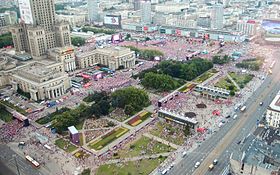
Eight cities were selected by UEFA as host venues. In a return to the format used at Euro 1992, Euro 1996 and Euro 2008, each of the four groups' matches were played in two stadiums. Host cities Warsaw, Gdańsk, Wrocław, Poznań, Kiev, and Lviv are all popular tourist destinations, unlike Donetsk and Kharkiv, the latter of which replaced Dnipropetrovsk as a host city in 2009.
In order to meet UEFA's requirement for football infrastructure improvements, five new stadiums were built and opened in advance of the tournament. The remaining three stadiums (in Kiev, Poznań and Kharkiv) underwent major renovations in order to meet UEFA's infrastructure standards. Three of the stadiums are categorised as UEFA's highest category stadiums. The transport infrastructure in Poland and Ukraine was also extensively modified on the request of UEFA to cope with the large influx of football fans.
UEFA organised fan zones in the eight host cities. They were located in the center of each city, with all 31 matches shown live on a total of 24 giant screens. The zones enabled supporters to come together in a secure and controlled environment. The Warsaw Fan Zone occupied 120,000 square meters and accommodated 100,000 visitors. In all, the fans zones had a 20% increase in capacity compared to Euro 2008.
Stadiums
A total of 31 matches were played during Euro 2012, with Ukraine hosting 16 of them and Poland 15.
| Poland | |||||||
|---|---|---|---|---|---|---|---|
| Warsaw | Gdańsk | Wrocław | Poznań | ||||
| National Stadium Built for tournament Capacity: 56,070 |
PGE Arena Built for tournament Capacity: 39,150 |
Municipal Stadium Built for tournament Capacity: 40,000 |
Municipal Stadium Reconstructed Capacity: 39,550 | ||||
| 3 matches in Group A (incl. opening match), 1 quarter-final and 1 semi-final |
3 matches in Group C and 1 quarter-final |
3 matches in Group A | 3 matches in Group C | ||||
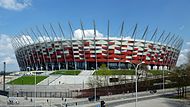
|

|
File:Stadion Miejski we Wrocławiu.jpg | 
| ||||
| |||||||
| Ukraine | |||||||
| Kiev | Donetsk | Kharkiv | Lviv | ||||
| Olympic Stadium Reconstructed Capacity: 64,640 |
Donbass Arena Built for tournament Capacity: 49,400 |
Metalist Stadium Reconstructed Capacity: 37,750 |
Arena Lviv Built for tournament Capacity: 32,990 | ||||
| 3 matches in Group D, 1 quarter-final and the final |
3 matches in Group D, 1 quarter-final and 1 semi-final |
3 matches in Group B | 3 matches in Group B | ||||
| File:Estadio Olímpico de Kiev 2011.jpg | File:Donezk Donbass Arena 01.JPG | File:Metallist Stadium Facade.jpg | File:Arena Lviv Euro 2012 (1).jpg | ||||
Ticketing
Tickets for the venues were sold directly by UEFA via its website, or are to be distributed by the football associations of the 16 finalists. Applications had to be made during March 2011 for the 1.4 million tickets available for the 31 tournament matches. Over 20,000 were forecast to cross the Poland–Ukraine border each day during the tournament. Over 12 million applications were received, which represented a 17% increase on the 2008 finals, and an all-time record for the UEFA European Championship. Owing to this over-subscription for the matches, lotteries were carried out to allocate tickets. Prices varied from €30 (£25) (for a seat behind the goals at a group match) to €600 (£513) (for a seat in the main stand at the final). In addition to individual match tickets, fans could buy packages to see either all matches played by one team, or all matches at one specific venue.
Broadcasting
Main article: UEFA Euro 2012 broadcasting rightsAccording to UEFA requirements, TP ensured approximately 2х70 Gbit/sec data communication speed from Polish stadiums and 2х140 Gbit/sec between Poland and Ukraine. This was required due to the fact that the matches were broadcast in HD quality. The multilateral production utilised 31 cameras to cover the action on and around the pitch at every match, with additional cameras following activities around the game, such as team arrivals at the stadiums, interviews, and media conferences. The official Euro 2012 broadcasting centre was located at the Expo XXI International Centre in Warsaw. The tournament was broadcast live by around 100 TV channels covering the whole world. 150,000,000 people were expected to watch the matches each day.
Team base camps
Each team had a "team base camp" for its stay between the matches. From an initial list of thirty-eight potential locations (twenty-one in Poland, seventeen in Ukraine), the national associations chose their locations in 2011. The teams trained and resided in these locations throughout the tournament, traveling to games staged away from their bases. Thirteen teams are staying in Poland and three in Ukraine.
| Team | Arrival | Last Match | Base camp | Group stage venues | QF venues | SF venues | Final venue |
|---|---|---|---|---|---|---|---|
| 5 June | 18 June | Warka Near Warsaw |
Gdańsk and Poznań | ||||
| 3 June | 21 June | Wrocław | Wrocław | Warsaw | |||
| 4 June | 17 June | Kołobrzeg | Kharkiv and Lviv | ||||
| 6 June | 24 June | Kraków | Kiev and Donetsk | Kiev | |||
| 6 June | 23 June | Donetsk | Kiev and Donetsk | Donetsk | |||
| 3 June | 28 June | Gdańsk | Kharkiv and Lviv | Gdańsk | Warsaw | ||
| 3 June | 22 June | Jachranka Near Warsaw |
Warsaw and Wrocław | Gdańsk | |||
| 5 June | 18 June | Sopot Near Gdańsk |
Gdańsk and Poznań | ||||
| 5 June | 1 July | Kraków | Gdańsk and Poznań | Kiev | Warsaw | Kiev | |
| 4 June | 17 June | Kraków | Kharkiv | ||||
| 28 May | 16 June | Warsaw | Warsaw and Wrocław | ||||
| 4 June | 27 June | Opalenica Near Poznań |
Kharkiv and Lviv | Warsaw | Donetsk | ||
| 3 June | 16 June | Warsaw | Warsaw and Wrocław | ||||
| 5 June | 1 July | Gniewino Near Gdańsk |
Gdańsk | Donetsk | Donetsk | Kiev | |
| 6 June | 19 June | Kiev | Kiev | ||||
| 6 June | 19 June | Kiev | Kiev and Donetsk |
- Poland
- Ukraine
Match ball
The Adidas Tango 12 was the official match ball of UEFA Euro 2012. The ball is named after the original Adidas Tango family of footballs; however, the Tango 12 and its variations have a completely new design. Variations of the ball have been used in other contemporary competitions including the Africa Cup of Nations and the Summer Olympics. It is designed to be easier to dribble and control than the reportedly unpredictable Adidas Jabulani used at the 2010 FIFA World Cup.
Match officials
On 20 December 2011, UEFA named twelve referees and four fourth officials for Euro 2012. On 27 March 2012, UEFA issued the full list of 80 referees to be used in Euro 2012, including the assistant referees, the additional assistant referees, and the four reserve assistant referees. Each refereeing team consisted of five match officials from the same country: one main referee, two assistant referees, and two additional assistant referees. All of the main referees, additional assistant referees, and fourth officials were FIFA referees, and the assistant referees (including the four reserve assistant referees) were FIFA assistant referees. For each refereeing team, a third assistant referee from each country was named to remain on standby until the start of the tournament to take the place of a colleague if required. In two cases, for the French and Slovenian refereeing teams, the standby assistant referees took the place of one of the assistant referees before the start of the tournament. Continuing the experiments carried out in the UEFA Champions League and UEFA Europa League, the two additional assistant referees were used on the goal line for the first time in European Championship history with approval from the International Football Association Board.
- Final referee; only referee assigned to four matches.
Four match officials, who served only as fourth officials, and four reserve assistant referees were also named:
|
|
Results
UEFA announced the schedule for the 31 matches of the final tournament in October 2010, with the final confirmation of kick-offs times being affirmed following the tournament draw in December 2011.
Group stage

The teams finishing in the top two positions in each of the four groups progressed to the quarter-finals, while the bottom two teams were eliminated from the tournament. If two or more teams are equal on points on completion of the group matches, the following criteria are applied to determine the rankings:
- Higher number of points obtained in the matches played between the teams in question;
- Superior goal difference resulting from the matches played between the teams in question (if more than two teams finish equal on points);
- Higher number of goals scored in the matches played between the teams in question (if more than two teams finish equal on points);
- If, after having applied criteria 1 to 3 to more than two teams, two teams still have an equal ranking, criteria 1 to 3 are reapplied exclusively to the matches between the two teams in question to determine the final rankings of the two teams. If this procedure does not lead to a decision, criteria 5 to 10 apply in the order given;
- Superior goal difference in all group matches;
- Higher number of goals scored in all group matches;
- If two teams that have the same number of points, goal difference, and goals scored finish their last group match against each other in a draw, and provided no other teams within the group have the same number of points, the ranking of the two teams in question is determined by penalty shoot-out. Otherwise, criteria 8 to 10 apply in the order given;
- Position in the UEFA national team coefficient ranking system;
- Fair play conduct of the teams (final tournament);
- Drawing of lots.
Note: As all teams have different UEFA national team coefficients, the last two tie-breakers (fair play conduct and drawing of lots) would never have applied in this tournament.
| Key to colours in group tables |
|---|
| Team progressed to the quarter-finals |
Group AMain article: UEFA Euro 2012 Group A
Rules for classification: Group stage tiebreakers (H) Hosts Notes:
Greece were placed above Russia based on their head-to-head record (1–0). Czech Republic were the first team to win a European Championship group with a negative goal difference
Group BMain article: UEFA Euro 2012 Group B
Rules for classification: Group stage tiebreakers
Group CMain article: UEFA Euro 2012 Group C
Rules for classification: Group stage tiebreakers
Group DMain article: UEFA Euro 2012 Group D
Rules for classification: Group stage tiebreakers (H) Hosts Notes:
Ukraine were placed above Sweden based on their head-to-head record (2–1).
Knockout stageMain article: UEFA Euro 2012 knockout stage The knockout stage of UEFA Euro 2012 began with the quarter-finals on 21 June 2012, and was completed on 1 July 2012 with the final at the Olympic Stadium in Kyiv, won by Spain. After the completion of the group stage on 19 June 2012, eight teams qualified for the quarter-finals (two from each group), which were played from 21 to 24 June 2012. Host nations Poland and Ukraine failed to qualify for the quarter-finals, making it only the third time in European Championship history that the host nation(s) failed to make it out of the group stage; at Euro 2000, co-host Belgium were eliminated at the group stage, and at Euro 2008, co-hosts Austria and Switzerland also failed to qualify for the quarter-finals. FormatAny game in the knockout stage that was undecided by the end of the regular 90 minutes was followed by 30 minutes of extra time (two 15-minute halves). If scores were still level after 30 minutes of extra time, there would be a penalty shootout (at least five penalties each, and more if necessary) to determine who progressed to the next round. As with every tournament since UEFA Euro 1984, there was no third place play-off. Qualified teamsThe top two placed teams from each of the four groups qualified for the knockout stage.
Bracket
Quarter-finalsCzech Republic vs Portugal
Germany vs Greece
Spain vs FranceSee also: France–Spain football rivalry
England vs Italy
Semi-finalsPortugal vs SpainSee also: Portugal–Spain football rivalry
Germany vs ItalySee also: Germany–Italy football rivalry
FinalMain article: UEFA Euro 2012 Final
References
External links
Quarter-finals
Semi-finals
FinalMain article: UEFA Euro 2012 Final
StatisticsMain article: UEFA Euro 2012 statisticsGoalscorers
Awards
The UEFA Technical Team was charged with naming a squad composed of the 23 best players over the course of the tournament. The group of eleven analysts watched every game at the tournament before making their decision after the final. Ten players from the winning Spanish team were selected in the team of the tournament, while Zlatan Ibrahimović was the only player to be included whose team was knocked out in the group stage. 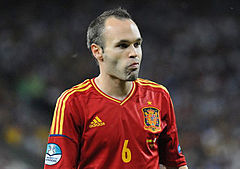
Fernando Torres tied with five other players on goals and with Mario Gómez on goals and assists; however, he played 92 fewer minutes than Gómez did, thus earning the title. Torres also became the first player to score in two finals. Klaas-Jan Huntelaar of the Netherlands was the overall top goalscorer of Euro 2012 (including qualification) with 12 goals.
Prizes
A total of €196 million was offered to the 16 teams competing in this tournament, an increase from the €184 million in the previous tournament. Each team received €8 million in start money and then received additional money, based on their performances. Spain, the winners of Euro 2012, were awarded a total prize of €23 million for their performance. The maximum prize achievable (for winning all group matches and winning the final) was €23.5 million. Complete list:
Extra payment based on teams performances:
Aside money, commemorative plaques are given to all participants together with special plaques for semi-final losers and finalists. Medals of gold and silver are awarded the winners and runners-up respectively whereas both semi-final losers are awarded bronze medals. The trophy given to the winners remains in the ownership of UEFA; however, they receive a full-size replica for their keeping. DisciplineIn the final tournament, a player was suspended for the subsequent match in the competition for either getting red card or accumulating two yellow cards in two different matches. UEFA's Control and Disciplinary body has the ability to increase the automatic one match ban for a red card (e.g. for violent conduct). Single yellow card cautions were erased at the conclusion of the quarter-finals, and were not carried over to the semi-finals (so that a player could only be suspended for the final by getting a red card in the semi-final). Single yellow cards and suspensions for yellow card accumulations do not carry over to the 2014 FIFA World Cup qualification tournament matches. The following players were suspended during the final tournament – for one or more games – as a result of red cards or yellow card accumulations:
Apart from discipline measures for yellow and red cards, UEFA fined the football associations of Croatia, England, Germany, Portugal, Russia and Spain a total of €417,000 for spectators incidents. Furthermore, the Portuguese association was fined €5,000 for delaying the start of the second half of the game against Germany. In addition to these, Danish striker Nicklas Bendtner was fined €100,000 and given a one match ban (to be applied in the 2014 FIFA World Cup qualification tournament) for revealing his sponsored underpants, violating UEFA regulations, during the celebration of his second goal in the match against Portugal. Penalty kicksNot counting penalty shoot-outs, four penalties were awarded during the tournament. Giorgos Karagounis was the only player who failed to convert his penalty, which occurred in the match against Poland.
MarketingTrophy tourThe Henri Delaunay Trophy began a journey through the host cities seven weeks before the start of the tournament. A hundred days before the first match a 35.5-metre-high (116 ft) hot air balloon in the shape of the trophy was flown in Nyon, Switzerland and visited 14 cities throughout the host countries, reminding spectators of the impending tournament. On 20 April 2012, the trophy tour started and visited the Polish cities of Warsaw, Wrocław, Gdańsk, Poznań, Kraków, Katowice and Łódź. After the Polish cities, the trophy visited seven Ukrainian cities: Kiev, Ivano-Frankivsk, Kharkiv, Donetsk, Dnipropetrovsk, Lviv, and Odesa. Logo, slogan and theme songsThe competition slogan, Creating History Together (Template:Lang-pl, literally, "Together we are creating the future", Template:Lang-uk, Tvorymo istoriyu razom), was announced along with the logo. The official logo for the tournament was unveiled at a special event at Mykhailivska Square, Kiev, on 14 December 2009. Designed by Portuguese group Brandia Central. It takes its visual identity from Wycinanki or Vytynanky, traditional form of paper cutting practised in rural areas of Poland and Ukraine. The art form symbolises the nature of the rural areas of both countries. As part of the event, landmark buildings in the eight host cities were illuminated with the tournament logo. The official Euro 2012 song is "Endless Summer" by the German singer Oceana. In addition, UEFA has retained the melody that was composed by Rollo Armstrong of Faithless on its behalf for the 2008 tournament. The Republic of Ireland has also produced an official song: "The Rocky Road to Poland" recorded by a collaboration of Irish performers has already reached number 1 in Ireland. In Spain, the broadcasting company Mediaset España commissioned the song "No hay 2 sin 3", performed by David Bisbal and Cali & El Dandee and produced by RedOne. The tournament has also been associated with the song "Seven Nation Army" by The White Stripes, which has been played in the stadiums after every goal. Merchandise and mascots UEFA signed a worldwide licensing agreement with Warner Brothers Consumer Products to help promote the tournament. The agreement involved licensing to third parties for a variety of other merchandising items. Also designed by Warner Bros. were the official tournament mascots, "Slavek and Slavko", twins that wore the national colours of the two host nations. The mascots were unveiled in December 2010, and named following an online poll. SponsorshipUEFA announced ten global sponsors and, for both Poland and Ukraine, three national sponsors as shown below. These sponsorships together with the broadcasting revenues were estimated to earn UEFA at least US$1.6 billion.
Concerns and controversiesMain article: Concerns and controversies related to UEFA Euro 2012After Poland and Ukraine were chosen by a vote of the UEFA Executive Committee as host countries for Euro 2012, several issues arose, which jeopardised the Polish/Ukrainian host status. In Ukraine there were financial difficulties related to stadium and infrastructure renovation related to the economic crisis. In Poland, issues arose related to corruption within the Polish Football Association. In April 2009 however, the president of UEFA, Michel Platini announced that all was on track and that he saw no major problems. After a UEFA delegation visited Ukraine in September 2011, he stated the country was "virtually ready for Euro 2012". Especially in the UK, there were allegations of racism in football in both host countries. The main cause of discussion was the BBC current affairs programme Panorama, entitled Euro 2012: Stadiums of Hate, which included recent footage of supporters chanting various antisemitic slogans and displays of white power symbols and banners in Poland, plus Nazi salutes and the beating of South Asians in Ukraine. The documentary was first echoed in much of the British press, but was then attacked for being one-sided and unethical: critics included other British media outlets; anti-racism campaigners, black and Jewish community leaders in Poland; Polish and Ukrainian politicians and journalists; England fans visiting the host nations and Gary Lineker. In response to Yulia Tymoshenko’s hunger strike and her mistreatment in a Ukrainian prison some European politicians and governments announced that they would boycott the matches in Ukraine. Ukraine came under criticism from animal welfare organisations for killing stray cats and dogs in order to prepare for Euro 2012. Ukrainian Ministry of Ecology and Natural Resources and Minister Of The Environment takes some actions to prevent killing animals but it still remains unclear how these measures will be enforced. Bomb explosions took place in Dnipropetrovsk, Ukraine, on 27 April 2012 and were described as a terrorist attack that may jeopardise the organisation of the tournament in Ukraine. Other minor important issues were associated with FEMEN’s group protests against prostitution and sex tourism in Ukraine, and enormous increases in hotel prices by many hoteliers in the country. In total, four nations were fined by UEFA for racist activities by their fans: Germany, Spain, Croatia and Russia. See alsoNotesReferences
External links
Warning: Default sort key "Uefa Euro 2012" overrides earlier default sort key "Knockout stage". |
|||||||||||||||||||||||||||||||||||||||||||||||||||||||||||||||||||||||||||||||||||||||||||||||||||||||||||||||||||||||||||||||||||||||||||||||||||||||||||||||||||||||||||||||||||||||||||||||||||||||||||||||||||||||||||||||||||||||||||||||||||||||||||||||||||||||||||||||||||||||||||||||||||||||||||||||||||||||||||||||||||||||||||||||||||||||||||||||||||||||||||||||||||||||||||||||||||||||||||||||||||||||||||||||||||||||||||||||||||||||||||||||||||||||||||||||||||||||||||||||||||||||||||||||||||||||||||||||||||||||||||||||||||||||||||||||||||||||||||||||||||||||||||||||||||||||||||||||||||||||||||||||||||||||||||||||||||||||||||||||||||||||||||||||||||||||||||||||||||||||||||||||||||||||||||||||||||||||||||||||||||||||||||||||||||||||||||||||||||||||||||||||||||||||||||||||||||||||||||||||||||||||||||||||||||||||||||||||||||||||||||||||||||||||||||||||||||||||||||||||||||||||||||||||||||||||||||||||||||||||||||||||||||||||||||||||||||||||||||||||||||||||||||||||||||||||||||||||||||||||
Cite error: There are <ref group=note> tags on this page, but the references will not show without a {{reflist|group=note}} template (see the help page).
- Articles to be merged from June 2012
- UEFA Euro 2012
- UEFA European Championship knockout stages
- Czech Republic at UEFA Euro 2012
- Portugal at UEFA Euro 2012
- Spain at UEFA Euro 2012
- France at UEFA Euro 2012
- Italy at UEFA Euro 2012
- Netherlands at UEFA Euro 2012
- Germany at UEFA Euro 2012
- Greece at UEFA Euro 2012
- Use dmy dates from June 2012
- 2011–12 in European football
- 2011–12 in Polish football
- 2011–12 in Ukrainian football
- International association football competitions hosted by Poland
- International association football competitions hosted by Ukraine
- UEFA European Football Championship tournaments


